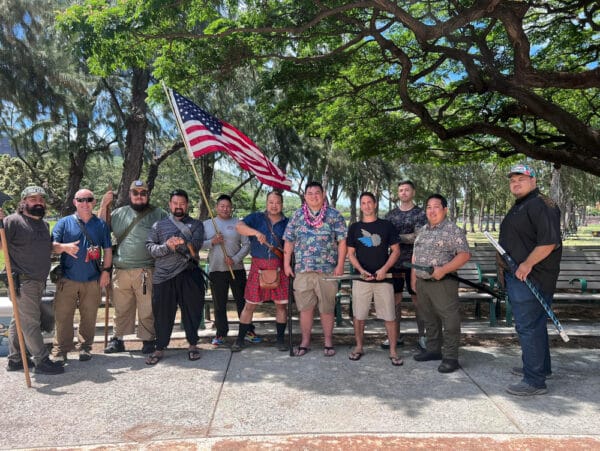
On May 14, 2024, Andrew Namiki Roberts, leader of the Hawaii Firearms Coalition, exercised his right to openly carry bladed weapons on a beach in Waikiki, Hawaii. Roberts carried a halberd, a highly visible medieval polearm. It did not evoke much response. With Robert and associates’ display of open carry, Hawaii joined those states where supporters of the Constitution openly and legally carry weapons to show the Second Amendment is not a dead letter in American law. Roberts could go about his protest legally because the legislature had restored the legal right to openly carry bladed weapons the day before, on May 13, 2024.
Hawaii became a U.S. territory in 1898. The islands became a state in 1959. Hawaii had a long history as a kingdom, where the ownership and carrying of weapons was highly regulated. Hawaii required a permit to carry concealed weapons in 1933. After statehood, the statute was widened to require a permit to openly carry pistols or revolvers in 1961. Permits to carry have been extremely difficult to obtain. At one point, only one permit had been issued, to anyone who was not a security guard, for several years.
In 1937, the territory of Hawaii passed a law banning the carry of “dangerous weapons,” which included any “dirk, dagger, blackjack, slug shot, billy, metal knuckles, pistol, or other deadly or dangerous weapon”. Once a state, the law was challenged numerous times. Firearms were considered dangerous weapons. Dive knives were not; machetes were commonly carried. The courts in Hawaii ruled that the weapon had to be made with the sole intention of being used as a weapon. Most knives could be carried openly or concealed if they were not designed with the primary purpose of being a weapon.
The law was altered on May 13, 2024, to apply only if the dangerous weapons were carried concealed. From hawaiinewsnow.com:
The governor signed HB 2342 into law Monday without fanfare, making it immediately legal to openly carry weapons that were banned in public until now.
Gun rights activist Andrew Namiki Roberts, leader of the Hawaii Firearms Coalition, decided to celebrate in a very visual way, brandishing medieval bladed weapons in a public park.
The change in Hawaii law comes as Hawaii’s extreme firearm restrictions are being challenged in court. The firearm laws are some of the most restrictive in the United States. In the Young v Hawaii case, the Ninth Circuit Court of Appeals upheld a ban on open carry, only to be reversed by the Supreme Court. The murder rate in Hawaii is similar to that of Vermont, where the legal right to carry a handgun, openly or concealed, without any permit, has existed for hundreds of years. Until the Supreme Court had vacated the Young v Hawaii case in Hawaii, it was virtually impossible to obtain a carry permit, openly or concealed. From Hawaii Public Radio:
In Hawaiʻi, it has traditionally been practically impossible to obtain police permission to carry a loaded gun in public. And so far that hasn’t changed, even after a U.S. Supreme Court ruling making it easier to get such permits. Since the decision in June, only one permit has been granted.
The Hawaii Firearms Coalition (HIFICO) is a Hawaii state activist group fighting to restore Second Amendment rights in Hawaii. The group has supported lawsuits challenging Hawaii weapons laws and procedures. They punch far above their weight.
When the Hawaii legislature changed the law banning the open carry of dangerous weapons, the group organized open carry events to exercise their rights and to demonstrate the silly nature of Hawaii’s weapons law. As with other open carry events nationwide, few noticed or cared. Instead of tourists running screaming in panic, the response from locals and tourists alike was mild curiosity. Considering dive knives, machetes, and other items were commonly carried without problems, it became obvious the previous law had been based on false premises.
Open or concealed carry of weapons does not cause problems. Murder and mayhem depend on mental attitudes and cultural values, not weapons. The problems are internal to the perpetrators, not external to weapon systems. Focusing on weapons and not on behaviors is a way to deny responsibility to the individuals involved. Such laws are philosophical statements of false assumptions about reality.
About Dean Weingarten:
Dean Weingarten has been a peace officer, a military officer, was on the University of Wisconsin Pistol Team for four years, and was first certified to teach firearms safety in 1973. He taught the Arizona concealed carry course for fifteen years until the goal of Constitutional Carry was attained. He has degrees in meteorology and mining engineering, and retired from the Department of Defense after a 30 year career in Army Research, Development, Testing, and Evaluation.

from https://ift.tt/JHLjXYd
via IFTTT

No comments:
Post a Comment